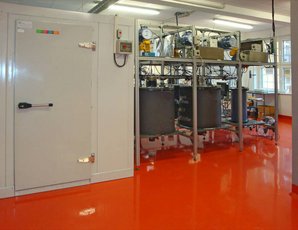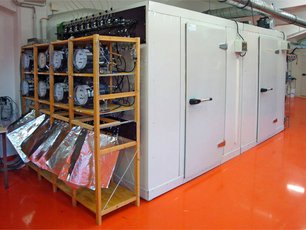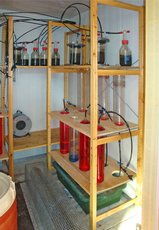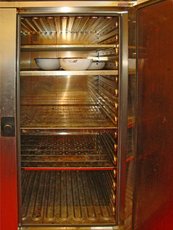- Research group seRo.inTech
"Use of innovative technologies to develop secondary raw material sources in Thuringia"
TAB, ESF+, 01/2024 - 06/2026
- ThIWert 2.0
"Innovation centers"
TAB, EFRE, 11/2023 - 09.2028
- phoTECH
"Photonic processes as a technological basis for cleaning indoor air, industrial air, biogenic air and urban air", Joint projects 3 and 4
BMBF, RUBIN-Alliance, 08/2023 - 07/2026
- ANCHOR
"Anthropocene Nutrient and water Control for HOlistic resilience and Recovery"
EU-Interreg, 05/2023 - 04/2026
- SCIP Plastics
"Sustainable Capacity building to reduce Irreversible Pollution by plastics"
BMUV, 12/2021 - 11/2024
- AuCity 3
"Collaborative and adaptive mixed reality in university teaching using the example of civil engineering"
BMBF, 03/2022 - 08/2024
- Research Group ThIWertBioMobil
"Mobilization of biomass utilization from secondary raw material sources in Thuringia"
TMWWDG, 01/2021 - 12/2022
- TRAPA India
"Transition pathways for solving the urban wastewater, fecal sludge and septage problem in Indian cities based on resource orientation and business models"
BMBF, 05/2020 - 12/2022
- BEGIN
"Transition towards Blue-Green-Infrastructure in sub-Saharan Africa" (Prephase)
06/2021 - 11/2021
- Bio2Geo
"Development and demonstration of an innovative ecological hybrid power plant for coupling bioenergy with geothermal energy for the supply of different consumer structures"
10/2018 - 09/2021
- Professional.Bauhaus
"Lifelong learning at the Bauhaus-Universität Weimar"
10/2011 - 09/2017
- FNR Algae
"Development of a land-based photobioreactor for marine seaweed and its integration into agricaltural operations"
11/2014 - 08/2017
- INTERREG NWE BioRefine
"Recycling inorganic chemicals from agro- and bio-industry waste streams"
05/2011 - 12/2015
- FP7 FERTIPLUS
"Reducing mineral fertilizers and agro-chemicals by recycling treated organic waste as compost and biochar products"
12/2011 - 11/2015
- TAB Research Group TestReal
"Techniques and structures to realise higher energy efficiency in urban areas"
05/2012 - 03/2015
- BMBF KREIS
"Demonstration project urban district Jenfelder Au - linking of regenerative energy production to innovative wastewater engineering in cities"
11/2011 - 09/2014
- DAAD University Partnerships
"Developing curricula in Nepal and cross-linking long-distance education"
01/2011 - 12/2014
- FNR BAW
"Anaerobe test procedures for the certification of biodegradable biopolymers"
12/2010 - 05/2013
- BMBF EUSSaWa
"Decision Support System for Saline Waters"
10/2010 - 09/2012
- BMU BioEnEf
"Improving the energy efficiency of composting and co-fermentation"
07/2009 - 06/2012
- FNR Start-up phase
"Strategies for improved start sequences of solid state fermentation in batch operation"
10/2008 - 07/2011
- FNR Control of biogas plants
"Transferring a fuzzy logic based control algorithm for process stability to agricultural large-scale biogas plants"
02/2008 - 01/2011 - EFRE PORTAFERM
"Development of a container-based small-scale biogas plant for liquid substrates"
02/2009 - 12/2010 - FNR Parameters of solid matter
"The influence of physical parameters of solid matter on solid state fermentation of renewable resources"
03/2005 - 02/2007
General information
Welcome to the Technical Center of the Bauhaus-Institute for Infrastructure Solutions (b.is). In addition to the project-related high dynamics in terms of experimental set-ups ranging from photocatalysis to photobioreactors and hydrogen production, permanent technology is also available with a focus on the main research areas, which will be presented below. The joint use and operation of the pilot plants by several professorships is mainly carried out in the intersection of waste, wastewater and energy.
Nass- / Flüssigvergärung
Auf sechs Reaktorplätzen können mit dem Volumen von 25 und 95 Litern mesophile Nassvergärungsversuche zur Optimierung von Substrateinsatz von Biogasanlagen sowie den Test von Regelungskonzepten zur Prozessoptimierung durchgeführt werden. Die folgenden Messdaten werden online erfasst:
- Gasvolumen mit Trommelgaszähler
- Gaszusammensetzung (CH4, CO2, O2, H2S, H2) mit Awite-Gasanalysegerät
- Fermentertemperatur und pH-Wert
Trocken- / Feststoffvergärung
Biogasbildungspotential
Substratcharakterisierung
Zur Beurteilung des anaeroben Prozesses können in Bezug auf die Substrateigenschaften neben den analytischen Parametern im Labor im b.is-Technikum folgende Untersuchungen durchgeführt werden:
- TS .. Trockensubstanzbestimmung
- oTS .. Glühverlust
- pH-Wert, Leitfähigkeit, Redoxpotential
Darüber hinaus können auch klassische physikalische Parameter von mineralischen und organischen Materialien bestimmt werden:
- Korngrößenverteilung
- Proctordichte
- Wasserkapazität
Für die Probenaufbereitung stehen Ein- und Zweiwellenzerkleinerer, Zentrifugen, ein Pressschneckenseparator, ein Autoklav und mehrere Homogenisierungs- und Dispergierungswerkzeuge zur Verfügung.




